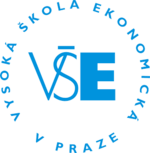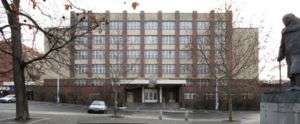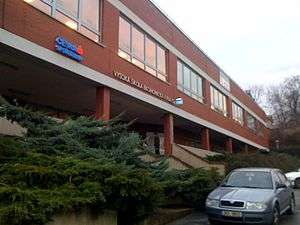University of Economics, Prague
| Vysoká škola ekonomická v Praze | |
 | |
| Type | Public |
|---|---|
| Established | 1919 |
| Rector | Prof. Ing. Hana Machková, CSc. |
Administrative staff | 1,150 (of that 720 academic) |
| Students | 19,441 |
| Location |
Prague, Czech Republic 50°5′2.61″N 14°26′27.96″E / 50.0840583°N 14.4411000°ECoordinates: 50°5′2.61″N 14°26′27.96″E / 50.0840583°N 14.4411000°E |
| Nickname | VŠE, Prague School of Economics |
| Affiliations | APSIA, ERASMUS, CEMS , PIM |
| Website | www.vse.cz |




The University of Economics, Prague (Czech: Vysoká škola ekonomická v Praze, abbreviated VŠE, also called Prague School of Economics) is a leading economics and business-oriented public university located in Prague, Czech Republic. It is the largest and most selective university in the field of economics, business and information technologies in the Czech Republic with almost 20,000 students in its bachelor, masters and doctoral programmes, and a top business school in Central Europe.
Schools and Campuses
Schools at the University of Economics in Prague are often called 'Faculties'. The university is located at three campuses. Its main campus is in Prague at Žižkov. A secondary campus is found in Jižní město on the outskirts of Prague. The Faculty of Management is located separately from the others at its own campus outside Prague in Jindřichův Hradec (110 kilometres away from Prague).
- 1. Faculty of Finance and Accounting (FFA) (Fakulta financí a účetnictví)
- 2. Faculty of International Relations (FIR) (Fakulta mezinárodních vztahů)
- 3. Faculty of Business Administration (FBA) (Fakulta podnikohospodářská)
- 4. Faculty of Informatics and Statistics (FIS) (Fakulta informatiky a statistiky)
- 5. Faculty of Economics (FEPA) (Národohospodářská fakulta)
- 6. Faculty of Management in Jindrichuv Hradec (FM) (Fakulta managementu v Jindřichově Hradci)
History
In 1919 Vysoká škola obchodní ("Business School") was established as a department of the Czech Technical University in Prague. It specialized in wholesale trade, banking and the organization of industrial companies. In 1949 the Vysoká škola politických a hospodářských věd (University of Political and Economic Sciences) was established, which was finally renamed the University of Economics in 1953. The University underwent a significant reform in 1989 after the Velvet Revolution.[1]
Academics and Ranking
Graduates
A small number of undergraduate students continue with their studies at renowned institutions abroad, with a growing number of placements at the University of Oxford, Georgetown University, London School of Economics, University of Chicago, the Chinese University of Hong Kong and other high-ranking universities. A number of graduate students have successfully obtained a scholarship through the Fulbright Program. Undergraduate students typically receive their BSc. degree (bc.) after 6 semesters of completed coursework and a successful defense of their bachelor thesis.
Graduates of the University of Economics in Prague follow many different career paths, however most of the fresh graduates choose the business track and commence their career in the private sector (88% graduates in 2009). Moreover, the vast majority of fresh graduates remain in Prague (79% graduates). Of the School of International Relations, 10% of the students already have international placements upon graduation.[2] and belong to the most sought after graduates in the Central European region and the Czech Republic itself (according to a 2011 study[3]), with top Schools being listed in this order:
- School of International Relations (#1 nationally)
- School of Informatics and Statistics (#3 nationally)
- School of Business Administration (#4 nationally)
- School of Economics (#5 nationally)
Graduate students typically receive their MSc. degree (Ing.) after further 4 semesters of completed coursework and a successful defense of their master's thesis. PhD. candidates have to hold a master's degree upon enrollment into the program anywhere in the Czech Republic and the PhD program is typically 4 years in length.
Research and International Cooperation
The University offers its students a superior education in terms of research fields offered, extra-curricular opportunities and a very attractive setting. Since 2000, the university has invested heavily into research (and its 10 research centres) as well as facilities development (in 2005, the new main building was completed[4]). Its efforts have been acknowledged by the Eduniversal Award "First Business School in Eastern Europe".[5] Speakers at the University have recently (as of 2011) included EU High Representative Catherine Ashton, most Czech government officials and the President, Helen Diaz of the World Bank, CEOs of the largest companies in Europe (including Winfried Vahland), OECD Secretary General; and about 70 visiting faculty come to teach at VŠE annually.
Over 400 students spend a semester abroad every year. Hosting institutions include Duke University (Fuqua School of Business), Copenhagen Business School, University of St. Gallen, Vienna University and many others. About 15% students come from abroad, typically from other member states of the European Union, United States and East-European countries.
APSIA Membership
The School of International Relations (via its Jan Masaryk Centre for International Studies) is an affiliate member of the Association of Professional Schools of International Affairs alongside Stanford University, University of Toronto, New York University and others.[6]
International rankings
In its first international ranking in 2010 (by the Financial Times), the University of Economics in Prague was awarded the 73rd place among Business Schools in selection, the second highest in the Post-Communist European countries.[7]
At Eduniversal awards in 2008, the University of Economics in Prague received the title '1st Business School in the Eastern European Zone', becoming one of the top 27 business schools in the world. Other regional winners were Harvard Business School, Copenhagen Business School, Melbourne Business School and University of Singapore. The ranking was based on a survey among deans of 1 000 business schools from 153 countries.[8]
Other
In an informal ranking of best business school websites by the Cybermetrics Lab (2010), the University of Economics scored highly and occupies the 6th place (after the Wharton School, Harvard Business School, Leonard N. Stern School of Business, Université de Montreal and the Copenhagen Business School), scoring 2nd best in Europe.[9]
The university is the primary venue of the largest educational project in the country, the Prague Student Summit, comprising Model UN, Model EU and Model NATO.[10]
International Outreach
14% of the University's students are foreign nationals. In 2010/2011, VŠE cooperated with 159 partner universities (including Sciences Po Paris, Universität zu Köln, Tilburg University, Stockholm School of Economics, University of St. Gallen, London School of Economics and Political Science, Tel Aviv University, University of Queensland, McGill University, Duke University and University of North Carolina at Chapel Hill). Admission to the University and most of its programmes is highly competitive (12%-30% admissions rate to the School of International Relations).[11]
Annually, over 60 visiting professors come to teach at the university and more than 90 courses are taught in English. The school offers a number of international degrees, including joint and double degrees.
The university is a member of CEMS (Global Alliance in Management Education), APSIA (Association of Professional Schools of International Affairs), and PIM (Partnership in International Management) networks.[8]
Visiting Students
The University of Economics is a popular destination for exchange students from all over the world. Over 430 students come to Prague each semester. Its Buddy System assigns each incoming student a Czech-speaking buddy for the length of their stay. Most incoming exchange students live in the university dormitories Jarov located about 15 minutes from the campus and have lunch and/or dinner in the new school cafeteria. In 2005, a new International Learning Center was established as part of the newly built building. Courses are offered in Czech, English, German, French and Russian. Both the university and the city offer a number of cultural events, most of which are easily accessible for students.
Notable alumni
- Jan Fischer, former Minister of Finance of the Czech Republic; former Prime Minister of the Czech Republic
- Zdeněk Tůma, governor of the Czech National Bank (2000–2010), politician
- Petr Kellner, investor, businessman (one of the USD billionaires), owner of PPF company[12]
- Václav Klaus, former President of the Czech Republic (2003-2013), former chairman of the Civic-Democratic Party and Prime Minister of the Czech Republic.
- Josef Tošovský, Prime Minister of the Czech Republic (1997–1998), governor of the Czech National Bank (1989–1992 and 1993–2000)
- Miloš Zeman, Prime Minister of the Czech Republic 1998-2002, President of the Czech Republic (2013-2018)
- Martin Jahn, Czech politician and economist
- Jiří Paroubek, Prime Minister of the Czech Republic (2005–2006), former chairman of Czech Social Democratic Party
- Josef Zieleniec, Member of the European Parliament
- Valtr Komárek, economist and politician
- Jiří Rusnok, politician and economist, Prime Minister of the Czech Republic (2013–2014), former Minister of Finance, Minister of Industry and Trade
References
- ↑ History | VŠE
- ↑ Graduate Pool | VŠE
- ↑ Lidove Noviny Newspaper
- ↑ Rajská budova
- ↑ Academic Year 2010/2011 at VŠE | VŠE
- ↑ AFFILIATE MEMBER SCHOOLS, APSIA
- ↑ European Business school rankings 2010
- 1 2 "VŠE získala cenu Nejlepší ekonomická vysoká škola ve střední a východní Evropě". VSE v Praze. Retrieved 6 January 2012.
- ↑ 2nd in Europe and 6th in the world | VŠE
- ↑ "Prague Student Summit". Association for International Affairs. Retrieved 1 January 2012.
- ↑ SIR Admissions 2007 | VŠE
- ↑ "Petr Kellner, The World's Richest People - Forbes.com". Forbes.
External links
- University website
- Virtual Economic Library Econlib website
- ISIS VŠE (Information system for students and teachers)
- iList (Independent student magazine and web)
- Economix (Student magazine)
- Unie studentů VŠE (Students' Union of the University of Economics in Prague)
| ||||||||||||||||||||||||||||||||||||||||||||||||||||||
| ||||||||||||||||||||||||||||||||||||||||||||||||||||||